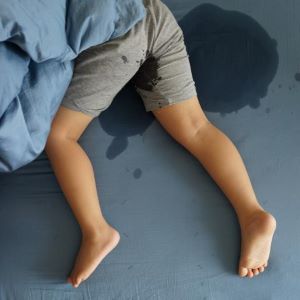
Bedwetting can be an emotional trial for many children and parents. Most children will successfully toilet train between 2-4 years old. However, it’s common for some children to have episodic nighttime accidents until they are 6 or 7. In fact, bedwetting occurs in 15% of children at age 5 and 10% of children at age 7. Let’s dive deeper into some of the primary and secondary causes of bedwetting, the emotional component of bedwetting and some smart approaches parents can take.
Common and genetic causes
The majority of children with bedwetting fall into the primary nocturnal enuresis category, which is “doctor-speak” for children age 5 and older, who may have been successful in toilet training during the daytime, but have never been able to be completely dry during the nighttime. Waking up to urinate during the nighttime hours involves a complex communication between the bladder and the unconscious brain. This communication sometimes takes longer to develop in young children. There are also some poor daytime toilet habits that contribute to bedwetting. For instance, if a child frequently puts off urinating for as long as possible to continuing playing, they’re more likely to also ignore those same signals to urinate at night. Genetics could also play a role. It’s been noted that a child with one parent who has a history of bedwetting will have a 40% chance of bedwetting as well. If both child’s parents have a history of bedwetting, the likelihood jumps to 75%. Additionally, it’s known that boys are twice as likely to experience bedwetting.
Secondary causes
Some common secondary causes for bedwetting include:
- Constipation: When a child is constipated, he leaves less available space in the belly and produces pressure on the bladder. Addressing constipation can reduce nighttime accidents.
- Stress: When major life changes, like divorce or death, occur in a family, children often absorb these stressors in a variety of ways. It’s not uncommon to see a regressing of toilet training and nighttime accidents.
- Deep sleep: The communication signals the bladder sends to the sleeping brain has to be strong enough to wake the child. Deep sleepers may tend to unwillingly ignore these messages.
One cause that wasn’t listed is the decision of the child - that’s because it’s often assumed bedwetting is the child’s fault. This is not true. Waking up to prevent nighttime accidents is something that occurs to the unconscious child, which means it’s simply out of their control. Furthermore, children can often become ashamed, embarrassed and frustrated with themselves when this happens, especially if a parent or sibling makes them feel like they are at fault. It’s important for parents to stress to their child that it’s not their fault, avoid any punishments for accidents, and praise them when they are dry.
Most children will spontaneously grow out of their bedwetting habits without any interventions, but if they don’t, here are some steps to try:
- Limit nighttime drinks 2 hours before bedtime. This will help keep the bladder as empty as possible.
- Encourage bathroom use right before bedtime and remind to use the bathroom regularly throughout the day.
- Make it easier for the child to get to the bathroom at night by adding nightlights to the hallway and bathroom.
- Consider purchasing a waterproof mattress cover and having spare sheets/pajamas on hand for when accidents do arise.
- No salty snacks or caffeinated and sugary beverages in the evenings. These will contribute to increased urination and additional fluid intake.
- Use a motivational sticker chart. By rewarding children with a sticker for every night they are dry, you eliminate the negative connotation and allow them to see their progress.
- A bedwetting alarm has been shown to be an effective means to condition a child to wake to urinate. Most children will achieve an accident-free night after several weeks of consistent use. This does require parent participation to confirm the child has fully awakened to the alarm.
Following these tips should help most parents and children achieve a bedwetting remedy. However, it’s important to remember the journey to dry nights can be a long one and will require a healthy dose of patience on the part of the parents.
If your child has a sudden onset of bedwetting after a period of dryness or has any other urinary or physical symptoms, a trip to their pediatrician is warranted for further evaluation. Parents who are still struggling, or have any additional concerns, should also talk with their pediatrician for the best approach for their child.
